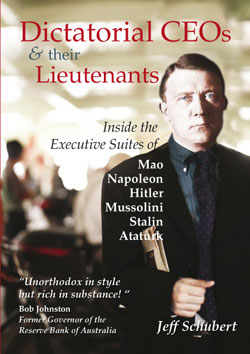US Missile Shield: Technology & Psychology · 25 February 2008
Australia’s Foreign Minister, Stephen Smith, says that missile defence technology has evolved and that the Government was now giving “careful consideration” to participating in US missile shield arrangements.
Yes Stephen, technology does evolve, but psychology changes little! And, military technology is not as benign as Santa Claus.
While the US claims missile defence is nothing but a shield, many other countries will see it as little more than a device to protect the US while it swings its sword where it wants. And the experiences of General Caulaincourt, Reich Marshal Goering, and ex-general Colin Powell, suggest that they have a point.
In 1812, General Caulaincourt, who had been French Ambassador to Moscow and had experience of the Russian winter, had a five hour conversation with Napoleon Bonaparte trying to persuade him not to invade Russia; many years later Hermann Goering had a conversation of similar length on the same issue with Hitler; and, according to Colin Powell, as Secretary of State he spent two and a half hours with the George W. Bush trying to persuade him not to invade Iraq: I tried to avoid this war. I took him through the consequences of going into an Arab country and becoming the occupiers.
Leaders and countries sometimes do very stupid things when they feel that they have enough power to get away with it. Russia, no-more than any other country, cannot afford to assume that other countries will not abuse their power and there are many ways of doing this other than an outright invasion.
In mid-2007 I was in a park in Pushkin on the outskirts of St. Petersburg when a 10-year old girl pointed out to me that this is where the Germans were beaten (in World War 2). Several days later, in the evening, I hailed down a private car to take me to Pushkin. The driver, a lawyer looking for a little extra money by acting as a taxi for me, made the same point about the Germans.
Like most people in almost all countries, most Russians see things from their position and can find it difficult to see things from the other side. In a recent survey, more than 60 percent of young Russians said they sympathize with Putin’s calling the collapse of the Soviet Union the twentieth century’s greatest geopolitical catastrophe. Another survey has found that just 10 percent of young Russians think Russia should apologize for the Baltic occupation, and Estonia’s recent removal of a Red Army war memorial from its capital led to genuine anger in Russian.
Sometimes nationalism is no more than a political card in recognition that the majority of people in almost any country (including Australia) are emotionally, and stupidly, vulnerable to this but there can also be legitimate issues. This is where US foreign policy is so important.
The inability of the present American and Australian leadership to understand the nuanced feelings of people in other countries is the greatest friend that anti-democrats and rampant xenophobic nationalists in those countries have.
In 1812, General Caulaincourt tried to get Napoleon to see the view from the other side when Napoleon complained that Europe could not see that Russia was the real enemy: As a matter of fact, it is Your Majesty who is the cause of everyone’s anxiety and prevents them from seeing other dangers. The governments are afraid there is going to be a World State.
Perhaps Putin has read Caulaincourt, or perhaps he is just reacting like the Europe that Napoleon was complaining about. At the Munich security conference in 2007, Putin said the US has overstepped its borders in all spheres and has imposed itself on other states. This is a world of one master, one sovereign, he said.
The US has for some time being acting in a way that provides considerable justification for Russian fears (the invasion of Iraq being the most notable example). And, like Napoleon’s Europe, Russia will react in some way.
First Deputy Prime Minister Ivanov has, for example, suggested that Russia will retaliate to the placing of missile defense facilities in Poland by putting missiles in Kaliningrad. Russian defence analyst Pavel Felgenhauer described Ivanov’s comments about Kaliningrad as an “empty threat” on the basis that Russia had no missiles with the right range to be fired from Kaliningrad and hit the proposed interceptors in Poland.
Felgenhauer misses the point. Arms races, which Ivanov is suggesting in a limited sense, are drawn out and unpredictable affairs. The lead up to WWI was a long time in coming, but was nourished by mutual suspicion and an arms race. Sarajevo was only a spark. This is not to suggest another war, but Russia (and not Russia alone) will react to US moves and that its reaction, supported by public opinion, will be to stymie US power in any way it can.
I made a presenation (listed on the left-hand side, “US Missile Defence”) to the Australian Institute of International Affairs (Sydney Branch) at the beginning of Putin’s time in power.


